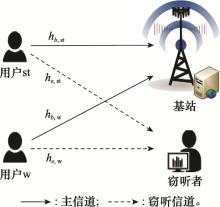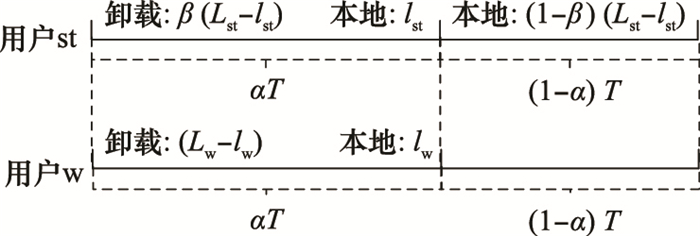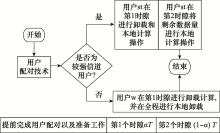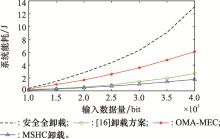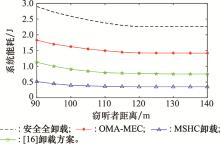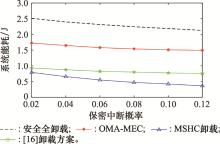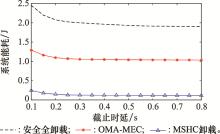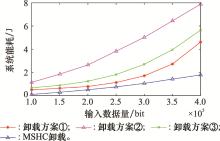Systems Engineering and Electronics ›› 2024, Vol. 46 ›› Issue (3): 1116-1124.doi: 10.12305/j.issn.1001-506X.2024.03.39
• Communications and Networks • Previous Articles Next Articles
Optimization of energy consumption with hybrid cooperative NOMA for secure MEC
Xueyong YU1,2,*, Xincheng FU1,2, Hongbo ZHU1,2
- 1. Jiangsu Key Laboratory of Wireless Communications, Nanjing University of Posts and Telecommunications, Nanjing 210003, China
2. Engineering Research Center of Health Service System Based on Ubiquitous Wireless Networks, Ministry of Education, Nanjing University of Posts Telecommunications, Nanjing 210003, China
-
Received:2022-11-30Online:2024-02-29Published:2024-03-08 -
Contact:Xueyong YU
CLC Number:
Cite this article
Xueyong YU, Xincheng FU, Hongbo ZHU. Optimization of energy consumption with hybrid cooperative NOMA for secure MEC[J]. Systems Engineering and Electronics, 2024, 46(3): 1116-1124.
share this article
| 1 | ZHENG T, WAN J, ZHANG J L, et al. Survey of computation offloading in edge computing[C]//Proc. of the International Conference on Computer, Information and Telecommunication Systems, 2020. |
| 2 | BENDRE B , THOMAS M , PRASAD S , et al. Creating transformational media solutions using 5G edge computing[J]. SMPTE Journal on Motion Imaging Journal, 2022, 131 (10): 8- 19. |
| 3 | YI S H, QIN Z R, LI Q. Security and privacy issues of fog computing: a survey[C] //Proc. of the International Conference on Wireless Algorithms, Systems, and Applications, 2015: 685-695. |
| 4 |
HE X F , JIN R C , DAI H Y . Deep PDS-learning for privacy-aware offloading in MEC-enabled IoT[J]. IEEE Internet of Things Journal, 2019, 6 (3): 4547- 4555.
doi: 10.1109/JIOT.2018.2878718 |
| 5 |
任品毅, 许茜. 基于移动边缘计算的时延能耗最小化安全传输[J]. 通信学报, 2020, 41 (11): 52- 63.
doi: 10.11959/j.issn.1000-436x.2020219 |
|
REN P Y , XU Q . Delay and energy minimization for MEC-based secure communication[J]. Journal on Communications, 2020, 41 (11): 52- 63.
doi: 10.11959/j.issn.1000-436x.2020219 |
|
| 6 |
ZHANG J L , CHEN B , ZHAO Y C , et al. Data security and privacy-preserving in edge computing paradigm: survey and open issues[J]. IEEE Access, 2018, 6, 18209- 18237.
doi: 10.1109/ACCESS.2018.2820162 |
| 7 |
WYNER A D . The wire-tap channel[J]. Bell System Technical Journal, 1975, 54 (8): 1355- 1387.
doi: 10.1002/j.1538-7305.1975.tb02040.x |
| 8 |
ZHAO R , TAN X , CHEN D H , et al. Secrecy performance of untrusted relay systems with a full-duplex jamming destination[J]. IEEE Trans. on Vehicular Technology, 2018, 67 (12): 11511- 11524.
doi: 10.1109/TVT.2018.2865968 |
| 9 |
HUANG C , CHEN G J , GONG Y , et al. Joint buffer-aided hybrid-duplex relay selection and power allocation for secure cognitive net-works with double deep q-network[J]. IEEE Trans. on Cognitive Communications and Networking, 2021, 7 (3): 834- 844.
doi: 10.1109/TCCN.2021.3063525 |
| 10 |
PHAM Q , NGUYEN H T , ZHU H , et al. Coalitional games for computation offloading in NOMA-enabled multi-access edge computing[J]. IEEE Trans. on Vehicular Technology, 2020, 69 (2): 1982- 1993.
doi: 10.1109/TVT.2019.2956224 |
| 11 | YANG H, WANG J B, CHENG M, et al. Secure resource allocation in mobile edge computing systems[C]//Proc. of the Global Communications Conference, 2019. |
| 12 | HE X F, JIN R C, DAI H Y. Physical-layer assisted privacy-preserving offloading in mobile-edge computing[C]//Proc. of the International Conference on Communications, 2019. |
| 13 |
WU W , ZHOU F H , HU Q Y , et al. Energy-efficient resource allocation for secure NOMA-enabled mobile edge computing networks[J]. IEEE Trans. on Communications, 2020, 68 (1): 493- 505.
doi: 10.1109/TCOMM.2019.2949994 |
| 14 |
PAN Y J , CHEN M , YANG Z H , et al. Energy efficient NOMA-based mobile edge computing offloading[J]. Communications Letters, 2019, 23 (2): 310- 313.
doi: 10.1109/LCOMM.2018.2882846 |
| 15 |
LI B G , WU W J , ZHAO W , et al. Security enhancement with a hybrid cooperative NOMA scheme for MEC system[J]. IEEE Trans. on Vehicular Technology, 2021, 70 (3): 2635- 2648.
doi: 10.1109/TVT.2021.3061718 |
| 16 |
WANG J B , YANG H , CHENG M , et al. Joint optimization of offloading and resources allocation in secure mobile edge computing systems[J]. IEEE Trans. on Vehicular Technology, 2020, 69 (8): 8843- 8854.
doi: 10.1109/TVT.2020.2996254 |
| 17 | LIN H C , CAO Y , ZHONG Y J , et al. Secure computation efficiency maximization in NOMA-enabled mobile edge computing networks[J]. IEEE Access, 2017, 7, 87504- 87512. |
| 18 |
WANG F , XU J , DING Z G , et al. Optimized multiuser computation offloading with multi-antenna NOMA[J]. IEEE Trans. on Communications, 2019, 67 (3): 2450- 2463.
doi: 10.1109/TCOMM.2018.2881725 |
| 19 |
DING Z , XU J , DOBRE O A , et al. Joint power and time allocation for NOMA-MEC offloading[J]. IEEE Trans. on Vehicular Technology, 2019, 68 (6): 6207- 6211.
doi: 10.1109/TVT.2019.2907253 |
| 20 |
WU Y J , NI K J , ZHANG C , et al. NOMA-assisted multi- access mobile edge computing: a joint optimization of computation offloading and time allocation[J]. IEEE Trans. on Vehicular Technology, 2018, 67 (12): 12244- 12258.
doi: 10.1109/TVT.2018.2875337 |
| 21 |
YE Y , HU R Q , LU G , et al. Enhance latency-constrained computation in MEC networks using uplink NOMA[J]. IEEE Trans. on Communications, 2020, 68 (4): 2409- 2425.
doi: 10.1109/TCOMM.2020.2969666 |
| 22 |
HE B , LIU A , YANG N , et al. On the design of secure non-orthogonal multiple access systems[J]. IEEE Journal on Selected Areas in Communications, 2017, 35 (10): 2196- 2206.
doi: 10.1109/JSAC.2017.2725698 |
| 23 |
DING Z G , LEI X F , KARAGIANNIDIS G K , et al. Survey on non-orthogonal multiple access for 5G networks: research challenges and future trends[J]. IEEE Journal on Selected Areas in Communications, 2017, 35 (10): 2181- 2195.
doi: 10.1109/JSAC.2017.2725519 |
| 24 |
SEDAGHAT M A , MULLER R R . On user pairing in uplink NOMA[J]. IEEE Trans. on Wireless Communications, 2018, 17 (5): 3474- 3486.
doi: 10.1109/TWC.2018.2815005 |
| 25 |
SUN Y , NG D W K , ZHU J , et al. Robust and secure resource allocation for full-duplex MISO multicarrier NOMA systems[J]. IEEE Trans. on Communications, 2018, 66 (9): 4119- 4137.
doi: 10.1109/TCOMM.2018.2830325 |
| 26 |
WANG F , XU J , WANG X , et al. Joint offloading and computing optimization in wireless powered mobile edge computing systems[J]. IEEE Trans. on Wireless Communications, 2018, 17 (3): 1784- 1797.
doi: 10.1109/TWC.2017.2785305 |
| 27 |
SUN W , LIU J J . Coordinated multipoint-based uplink transmission in Internet of Things powered by energy harvesting[J]. IEEE Internet Things, 2018, 5 (4): 2585- 2595.
doi: 10.1109/JIOT.2017.2782745 |
| 28 | 李斌, 刘文帅, 谢万城, 等. 智能反射面赋能无人机边缘网络计算卸载方案[J]. 通信学报, 2022, 43 (10): 223- 233. |
| LI B , LIU W S , XIE W C , et al. Computation offloading scheme for RIS-empowered UAV edge network[J]. Journal on Communications, 2022, 43 (10): 223- 233. |
| [1] | Guangda ZHANG, Qinghua REN, Zhikai FAN. Physical layer security transmission schemes based on simultaneous wireless information and power transfer for multi-antenna relay systems [J]. Systems Engineering and Electronics, 2023, 45(6): 1856-1865. |
| [2] | Guangda ZHANG, Qinghua REN, Zhikai FAN. Security transmission scheme for multi-relay system with a friendly jammer-assisted based on energy harvesting [J]. Systems Engineering and Electronics, 2023, 45(3): 876-885. |
| [3] | Han CHEN, Jing ZHANG, Jun DONG, Jie DONG. MEC offloading scheme based on joint optimization of subtaskscheduling and delay [J]. Systems Engineering and Electronics, 2023, 45(2): 572-579. |
| [4] | Fatang CHEN, Xia YANG, Caijun HAN. An improved algorithm of fast-uplink grant access for MTC [J]. Systems Engineering and Electronics, 2023, 45(12): 4064-4072. |
| [5] | Jun ZHANG, Sai LI, Shuheng ZHANG, Ruping ZHAI, Xiaoyu DANG. SS-CPM satellite signal acquisition algorithm in NOMA [J]. Systems Engineering and Electronics, 2022, 44(9): 2929-2935. |
| [6] | Hong ZOU, Chenyang BAI, Peng HE, Yaping CUI, Ruyan WANG, Dapeng WU. Edge service placement strategy based on distributed deep learning [J]. Systems Engineering and Electronics, 2022, 44(5): 1728-1737. |
| [7] | Xiaorong JING, Zhenyuan SONG, Yue LUO, Yudan MA. Design of physical layer safety scheme aided with IRS and artificial noise for MIMO communication systems [J]. Systems Engineering and Electronics, 2022, 44(10): 3266-3274. |
| [8] | Yin LU, Gaoyu WANG, Chuying YANG, Lingqing YANG, Kun ZHAO, Hongbo ZHU. NOMA relay selection and cooperative transmission based on single source optimal path [J]. Systems Engineering and Electronics, 2022, 44(1): 292-298. |
| [9] | Danyu DIAO, Buhong WANG, Kunrui CAO, Runze DONG, Tianhao CHENG. Secrecy performance analysis of UAV-based communications against full-duplex eavesdropping [J]. Systems Engineering and Electronics, 2022, 44(1): 313-319. |
| [10] | Yu FANG, Na LYU, Kun CHEN. Dynamic threshold algorithm for SPMA protocol in joint power domain [J]. Systems Engineering and Electronics, 2021, 43(8): 2332-2340. |
| [11] | Bing FANG, Bing HAN. Secure beamforming method for the MISO SWIPT system [J]. Systems Engineering and Electronics, 2021, 43(6): 1692-1698. |
| [12] | Chenwei GU, Zhi LIN, Min LIN, Luyao XIE, Jian OUYANG, Shuo HUANG. Robust secure beamforming design for the downlink of satellite communications [J]. Systems Engineering and Electronics, 2021, 43(5): 1361-1370. |
| [13] | Zuxia YUAN, Min LIN, Xiaoyu LIU, Zining WANG, Bo HUANG. Performance analysis of a hybrid satellite-terrestrial cooperative networks with multiuser feedback [J]. Systems Engineering and Electronics, 2021, 43(4): 1089-1098. |
| [14] | Zhenzhen YAN, Bo LI, Mao YANG, Zhongjiang YAN. Hybrid non-orthogonal multiple access method based on genetic algorithm [J]. Systems Engineering and Electronics, 2021, 43(3): 832-838. |
| [15] | Xiaorong JING, Sisi ZHANG. Precoder design based on dynamically sub-connected hybrid architecture in millimeter wave massive MIMO-NOMA systems [J]. Systems Engineering and Electronics, 2021, 43(12): 3716-3724. |
| Viewed | ||||||
|
Full text |
|
|||||
|
Abstract |
|
|||||
